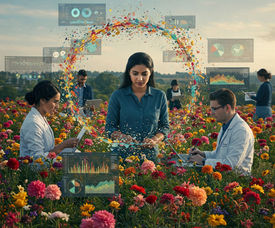How AI is Revolutionizing Customer Service in the Tourism and Hospitality Industry
- Tretyak
- 3 days ago
- 3 min read

The tourism and hospitality industry is undergoing a transformative shift, driven by the integration of Artificial Intelligence (AI) technologies. Beyond creating personalized experiences for guests, AI is playing a pivotal role in streamlining operations, boosting efficiency, and optimizing resource allocation.
1. Personalizing the Guest Experience
One of the most significant ways AI is enhancing customer service is by personalizing the guest experience. By analyzing guest data and preferences, AI-powered tools can:
Provide personalized recommendations: AI algorithms can analyze guest data, including past travel history, online activity, social media interactions, and even real-time contextual information like location and weather, to provide highly relevant and personalized recommendations. This includes suggesting destinations, activities, restaurants, and other experiences that align with a guest's interests and preferences. For example, AI can recommend off-the-beaten-path attractions to a traveler interested in cultural experiences or suggest restaurants based on a guest's dietary restrictions and cuisine preferences.
Offer tailored services: AI-powered chatbots and virtual assistants can provide personalized assistance to guests, such as booking tours, making reservations, and answering questions. These AI-powered concierges can provide real-time information, offer customized itineraries, and even anticipate guest needs, creating a truly personalized and seamless travel experience.
Create a sense of anticipation: AI can be used to create a sense of anticipation and excitement for guests before they even arrive at their destination. For example, AI-powered tools can send personalized welcome messages, offer pre-arrival check-in options, and provide tailored recommendations for activities and attractions based on the guest's interests and arrival date.
2. Enhancing Communication and Accessibility
AI is also transforming the way businesses communicate with their guests. By leveraging AI-powered translation services and multilingual support, businesses can:
Break down language barriers: AI-powered translation services can help businesses communicate with guests in multiple languages, improving accessibility and customer satisfaction. This enables businesses to cater to a global audience and provide a more inclusive experience for all guests.
Provide 24/7 support: AI-powered chatbots and virtual assistants can provide 24/7 support to guests, answering questions, resolving issues, and providing information around the clock. This ensures that guests always have access to assistance, regardless of the time zone or day of the week.
Offer personalized communication: AI can be used to personalize communication with guests, such as sending targeted promotions and offers based on their preferences, travel history, and past interactions. This allows businesses to build stronger relationships with guests and increase customer loyalty.
3. Improving Customer Feedback and Sentiment Analysis
AI can also be used to analyze guest feedback and sentiment, allowing businesses to identify areas for improvement and enhance the overall guest experience. By analyzing data from reviews, social media, and other sources, AI can:
Identify trends and patterns: AI can identify trends and patterns in guest feedback, such as common complaints or areas of dissatisfaction. This allows businesses to pinpoint areas for improvement and address issues proactively.
Measure customer satisfaction: AI can be used to measure customer satisfaction across various touchpoints, from check-in to check-out and beyond. This data can be used to track progress, identify areas for improvement, and benchmark performance against competitors.
Personalize the guest experience: AI can be used to personalize the guest experience based on feedback and preferences. For example, if a guest mentions a preference for quiet rooms in their feedback, AI can ensure that they are assigned a room that meets their needs.
In conclusion, AI is revolutionizing the tourism and hospitality industry by enhancing customer service, improving communication, and creating a more personalized and memorable experience for guests. As AI technologies continue to evolve, we can expect to see even more innovative applications that will further transform the way businesses interact with their customers.































































































Comentários